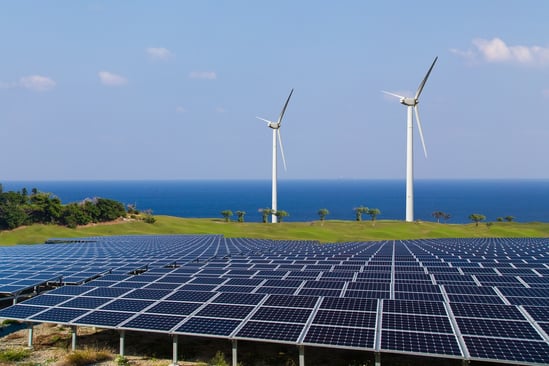Top 5 Construction Tax Benefits and Incentive Programs in New Jersey

New Jersey offers many incentives for property owners, most of them focusing on energy efficiency and renewable generation, as well as Urban Enterprise Zones. Construction incentives improve the financial outlook of projects, either by lowering their net cost or by adding to the benefits achieved.
This article will provide an overview of the main tax benefits and financial incentives you can claim for construction projects and building upgrades in NJ. Note that these programs establish technical requirements projects to be eligible, so make sure you work with qualified designers and consultants.
There are two main types of tax benefits. An exemption represents taxes you don’t have to pay for specific products or services, while a credit is a benefit you can deduct from your normal tax burden. Both tax exemption and credits reduce the total ownership cost of a project, but the way in which you get the benefit differs.
Get a project design that meets all incentive requirements.
1) Sales Tax Exemptions for the NJ Construction Sector
The sales tax in New Jersey is 6.625%, but many product categories are exempt. For building owners, the most relevant exempt products are solar energy devices. The benefit applies for any system that produces heating, cooling, electricity or mechanical power from solar radiation, as well as complementary technologies that store the energy generated from the sun.
Any building upgrade that increases property value or extends service life is partially exempt from the sales tax. Property owners only pay the sales tax for construction materials, but not for labor.
Contractors performing work for companies in Urban Enterprise Zones (UEZ) can claim certificates to purchase construction materials without paying the sales tax. However, the benefit is exclusively for materials that will be used in projects with the tax-exempt client. As of March 2018, there are are 27 UEZs in total throughout New Jersey.
2) Property Tax Exemption for Renewable Energy Systems in NJ Buildings
If you own a building in New Jersey and install a renewable energy system, any corresponding increase in your property value is not subject to property taxes. For example, if a building with an assessed value of $1,000,000 is equipped with a solar power system that increases value by $100,000, the property taxes are still calculated based on $1 million and not $1.1 million. The benefit applies for residential, commercial, industrial and mixed-use buildings.

This tax benefit has existed since October 2008, and the following renewable energy systems are eligible:
- Solar heating: domestic hot water, indoor spaces and industrial processes
- Solar photovoltaic systems
- Geothermal: Direct-use or electricity generation
- Wind power
- Biomass and landfill gas
- Hydroelectricity
- Geothermal heat pumps
- Tidal and wave power
- Fuel cells, using either renewable or non-renewable fuels
Note that you don’t get the property tax exemption right away after project completion. You must get in touch with an authorized property assessor, and get a certificate excluding the renewable energy system from the assessed property value. You must also fill and submit a special form from the New Jersey Division of Taxation: Application for Certification of Renewable Energy Systems.
Of course, any renewable energy system installed in NJ must meet any applicable construction standards, local and national.
3) NJ ENERGY STAR Program for New Residential Constructions
The NJ Clean Energy Program offers incentives for residential constructions, provided that they meet a series of energy performance requirements. There is a different incentive table for single-family, small multifamily and large multifamily properties, and the rebate is calculated based on two factors: the Home Energy Rating System (HERS) score, and three increasing categories of energy performance.
The HERS Index Score indicates the energy performance of a home, and a lower value corresponds with less energy consumption. The minimum HERS to get incentives from the NJ Clean Energy Program changes depending on the type of property:
- 65 for single-family homes
- 70 for small multifamily constructions (duplex, triplex, townhouses, etc.)
- 75 for large multifamily constructions (apartments, condominiums)
As the HERS Index Score becomes lower (less energy consumption), the project becomes eligible for a larger rebate. The three categories of energy performance are as follows, and they increase the rebate amount just like a better HERS score.
| Category | Description |
| ENERGY STAR Home | 15% more efficient than required by the building code and meets ENERGY STAR version 3.1. |
| Zero Energy Ready Home | Meets ENERGY STAR home requirements and is insulated according to the International Energy Conservation Code (IECC 2015). |
| Zero Energy Home + 100% Renewables | Same as above, but fully powered with renewable sources. |
For example, according to the applicable incentive tables in March 2018, a new ENERGY STAR home with a HERS score of 65 gets $1,750. However, a zero energy home with 100% renewable generation and a score of 20 or less gets $24,250.
Existing homes cannot participate in the program, but they have the Home Performance with ENERGY STAR program. Based on a home energy audit, the program offers a rebate of up to $4,000 plus one of the following financing options:
- 0% financing for up to $10,000 and a 7-year term.
- 4.99% financing for up to $15,000 and a 10-year term.
4) COOLAdvantage and WARMAdvantage Programs
As implied by their name, these programs offers rebates for heating and cooling upgrades in existing residential properties. The rebate amount is calculated based on the type of equipment, and a minimum efficiency level must be met for a system to be eligible.
|
WARMAdvantage Eligible Equipment |
COOLAdvantage Eligible Equipment |
|
|
In addition to meeting minimum efficiency levels, these building upgrades must be properly sized for their application. As proof, the NJ Clean Energy Program requires heating and cooling calculations according to ACCA Manual J (Residential Load Calculation) and Manual S (Residential Equipment Selection).
5) New Jersey SmartStart Buildings
NJ SmartStart Buildings is an incentive program for commercial and industrial building upgrades, and it applies for new constructions and existing facilities. The program covers a wide range of upgrades, as long as you meet the technical requirements in each case. For example, in a lighting upgrade project you only get the incentive for lamps and fixtures that are ENERGY STAR certified or DesignLights Consortium (DLC) listed.
The NJ SmartStart Buildings program offers rebates for projects in following categories:
- Electric chillers
- Electric unitary HVAC equipment
- Foodservice equipment
- Gas cooling
- Gas heating (indoor space or domestic hot water)
- Ground source heat pumps
- Lighting upgrades and controls
- Refrigeration: controls, efficient doors and covers, and efficient freezer motors
- Variable frequency drives
If a project has the potential to save gas or electricity and is not found among the categories above, the owner can submit an application for a custom energy efficiency measure, and may be eligible for the incentive.
Conclusion
New Jersey offers a wide range of incentives for property owners seeking to improve their buildings. Note than green construction is a common theme, since most tax benefits and rebates focus on energy efficiency, renewable generation, or both.
Most incentive programs establish minimum performance requirements to ensure the funds result in benefits. The best recommendation to meet these requirements is working with qualified engineering professionals.

Michael Tobias
Michael Tobias, the Founding Principal of NY Engineers, currently leads a team of 150+ MEP/FP engineers and has led over 4,000 projects in the US
Join 15,000+ Fellow Architects and Contractors
Get expert engineering tips straight to your inbox. Subscribe to the NY Engineers Blog below.

